- Home
- Parts of a Sentence
Parts of a Sentence
The main two parts of a sentence are the subject and predicate, with the subject identifying whom or what the sentence is about and the predicate giving more information about the subject.
The elements within the predicate adding more detail or meaning, are verbs, direct objects, indirect objects, and subject complements.
We'll now look at each of these in more detail.

Subject
The subject of a sentence is the person, place, or thing that the sentence is about.
If it comes before an action verb (e.g. climb, eat, build, say etc) then it is the part of the sentence that shows whom or what is doing that action. If it comes before a state verb (e.g. is, see, smell) it tells us whom or what is in that state of being.
It is usually a noun or pronoun and can also include modifying words, phrases or clauses. Here are some examples of subjects in a sentence:
- The woman...
- Cars....
- The boy in the red coat... (includes modifying phrase)
Predicate
While the subject is what the sentence is about, the predicate is what is being said about the subject.
It will always include a verb but will usually also include other elements. So these are what it will/may include:
- Verb
- Direct Object
- Indirect Object + Direct Object
- Direct Object + Object Complement
- Subject Complement
In the examples below, the predicate is in bold.
- The woman is hot.
- Cars are blocking all the parking spaces.
- The boy in the red coat is trying to find his toy.
- She is a police officer.
Predicates as parts of a sentence can get a little more complex than this as there can be predicates within predicates when there are other clauses in the sentence (the ones above have just one clause) and there are also compound predicates.
Objects
The predicate always includes and starts with a verb, but it may also be followed by objects.
Direct Object
A direct object is the receiver of the action within a sentence, and it is usually a noun or pronoun. They are used with action verbs and are shown below in bold:
- He built a cottage
- The horse jumped the fence
- He ate some dinner
- I hit him
The complete predicate in this case is "built a cottage" and so on.
Indirect Object
Indirect objects can only be in a sentence if there is also a direct object. They indicate to whom or for whom the action of the sentence is being done. Again, the indirect object is usually a noun or pronoun.
They are shown below in bold (the direct object is now the last noun).
- He built his family a cottage
- She bought them some presents
- He gave his girlfriend a kiss
The complete predicate in this case is "built his family a cottage" and so on.
Learn more about the difference between direct and indirect objects.
Object Complement
Object complements provide more information about or describe the direct object, and they can be nouns or adjectives.
- He built the house shoddily.
- Exciting films make me happy.
- The students elected John as president of the student's union.
So to take the first one, the direct object is 'the house' and it is being described as 'shoddily built'.
The complete predicate is: "built the house shoddily".
Subject Complement
It was explained above that objects are used with action verbs. However, for state verbs (verbs that describe a state of being e.g. is, see, hear, feel etc) subject complements follow the verb.
A subject complement either renames or identifies the subject by including a noun - predicate nominative - or describes the subject by having an adjective - predicate adjective.
- John is a really nice person
- She seems happy
- I was impressed by the film
The complete predicate in this case is "is a really nice person" and so on.
Parts of a Sentence Summary
The parts of a sentence can be divided into two main parts:
- Subject: who or what the sentence is about
- Predicate: what is being said about the subject
The predicate will start with a verb and could have various other elements:
- verb + indirect object/direct object/object complement/subject complement
New! Comments
Any questions or comments about the grammar discussed on this page?
Post your comment here.








